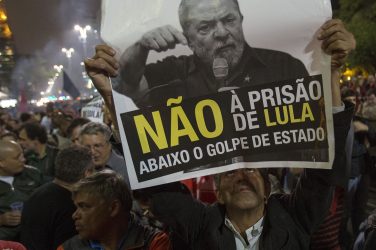It took close to five hours the deposition of former President Luiz Inácio Lula da Silva to federal judge Sergio Moro. Lula answered questions from Moro, the prosecution, attorneys from the Federal Public Ministry and made a closing argument.
The former president is accused of having received bribes amounting to 3,700,000 reais (US$ 1.2 million) from the contractor OAS in the form of reforms in an apartment in Guarujá, in the coast of São Paulo. In return, the company would get contracts from the federal government.
Lula’s testimony began at around 2:15 pm. Wearing a tie with the colors of the flag of Brazil, the former President entered the building of the Federal Court in Curitiba, Paraná state, accompanied by his lawyer, Cristiano Zanin.
Protesters and allied politicians accompanied Lula until the building. Between the allies that went to Curitiba to support him, was former President Dilma Rousseff.
The deposition took place under heavy security outside the building. About 3000 men from the federal, state and municipal levels were used.
Throughout the day, hundreds of military police blocked a 150 meter perimeter around the court’s building. Agents of the Federal Highway police and the Federal Police took care of protecting the building itself.
Protesters against and in favor of Lula marched in different points of the city. According to authorities, about 6000 demonstrators who support Lula were in Curitiba to accompany the interrogation. In all, there were 128 buses from several Brazilian states.
Lula’s Reaction
After his testimony, Lula participated in a political act in downtown Curitiba. He spoke for about 20 minutes defending himself from accusations of corruption.
According to the police, 5,000 people attended the act. The organizers, however, estimated the crowd at 50, 000.
The ex-president defended himself by saying that there is no evidence that he owns any apartment in Guarujá. “I want someone to tell me it’s my apartment,” he said. He also said that he is ready to testify in court as many times as necessary, adding: “If you have a Brazilian, if there’s a human being who is in search of the truth its me.”
Moro and Lula
When Brazil’s former President Lula da Silva and Judge Sergio Moro met for the first time in a courtroom on Wednesday, contrasts and stakes could hardly be greater.
One is the country’s most popular president ever and the front-runner in next year’s election – a former union leader who still whips up crowds with his fiery and folksy oratory.
The other, a soft-spoken law professor who represents Lula’s main obstacle to power. The legacy and political future of Brazil’s first working-class president are on the line as Lula faces one of the five criminal cases against him, part of the biggest corruption probe in the country’s history.
While denying any wrongdoing, Lula and his lawyers have turned his defense into an attack on Moro himself, arguing the judge’s track record in overseeing the graft probe has undermined his impartiality.
Lula’s supporters traveled from across Brazil to the southern city of Curitiba to protest outside the court.
Local media has fed expectations of a confrontation with a breathless buildup to Wednesday’s hearing. One news magazine’s cover painted the two as masked wrestlers going head to head. On another, they are boxers “Settling Scores.”
Pollster DataFolha found Moro was one of the few public figures who could beat Lula in the 2018 presidential race – though Moro denies he will enter politics.
The 44-year-old judge has avoided addressing the electoral impact of his decisions and discouraged portrayals of him as David to Lula’s political Goliath.
Lula’s testimony is just one more step in a three-year-old operation, insists Moro, who has kept lecturing public university students on criminal law as he runs the probe.
“I’m a little concerned by this climate of confrontation, these heightened expectations about something that may be totally banal,” the judge said at a public event on Monday, regarding this week’s hearing.
Moro has already sentenced dozens of businessmen and money launderers for a bribery scheme paying billions of dollars to politicians in return for public contracts, political favors and deals with state firms such as oil giant Petrobras.
Elected officials in Brasília must be tried by the Supreme Court, so prosecution has moved more slowly against alleged beneficiaries in the ruling Brazilian Democratic Movement Party and the Workers Party, which ran the country under Lula and his successor Dilma Rousseff from 2003 to 2016.
If Lula is found guilty when Moro hands down his verdict in an estimated 45 to 60 days, and then loses an appeal, he’d be barred from running for office again and face prison.
On Monday, Moro began hearing testimony in a second trial against Lula, regarding 12 million reais (US$ 4 million) of land bought by a construction firm to be used for his institute. A conviction in either case, if upheld in an appeals court before elections in October next year, would bar him from seeking office.
While Lula’s allies are calling for tens of thousands of partisans to convene in Curitiba, Moro posted a Facebook video discouraging a rival march by supporters of the investigation. Yet even that call for restraint stirred controversy.
“Judge Moro, who ought to be impartial, is speaking directly to his supporters. That is not normal in a democratic system. In a democracy, politicians have supporters and adversaries – not judges,” said Lula attorney Cristiano Zanin in a video response.
The exchange underscored that while both Lula and Moro face public scrutiny, the judge may have more to lose if the interrogation devolves into a contentious exchange. A courtroom spat would stoke complaints from Lula supporters who call the investigation a political witch hunt and bolster his lawyers’ demands that another judge try the case.
Attempts at such a legal maneuver are not uncommon, said Oscar Vilhena Vieira, dean of the law school at the Getúlio Vargas Foundation.
In Brazil, the same judge is usually responsible for overseeing an investigation and then ruling on a case. Yet relations between Moro and Lula’s team are especially tense amid their campaign to discredit him, which included the lawyers’ complaint to the United Nations that the judge violated Lula’s human rights during the corruption investigation.
Moro often cites the value of public support for the task force he oversees, pointing to the lessons of Italy’s “Mani Pulite” graft probe in the 1990s to show the importance of popular opinion to sustain a major corruption investigation.”
From a political perspective, there is a greater risk for Judge Moro,” said Vieira. “His rhetorical options are far more limited. He has to take great care not to fall into the traps set by Lula’s lawyers.”
ABr/Mercopress






